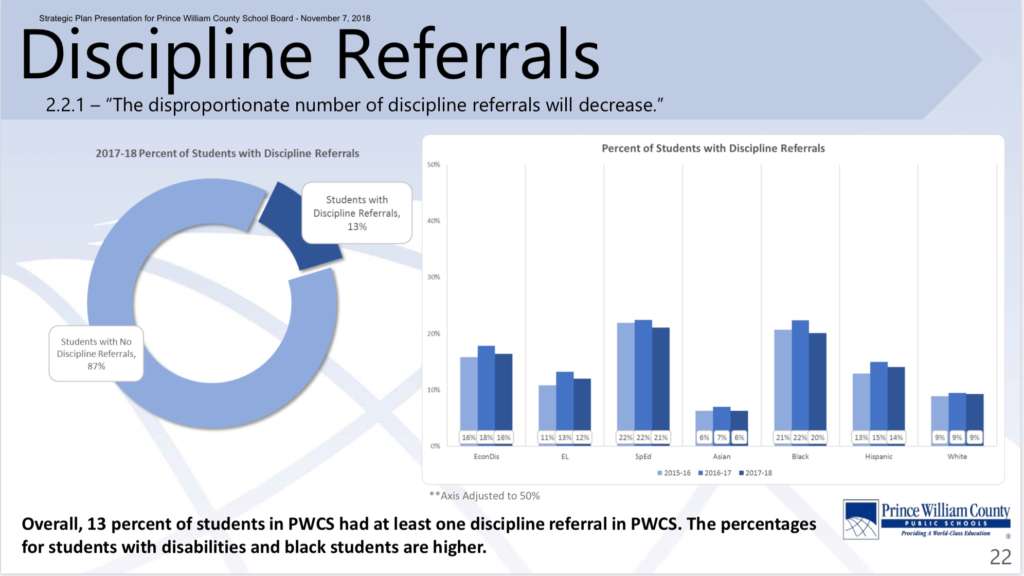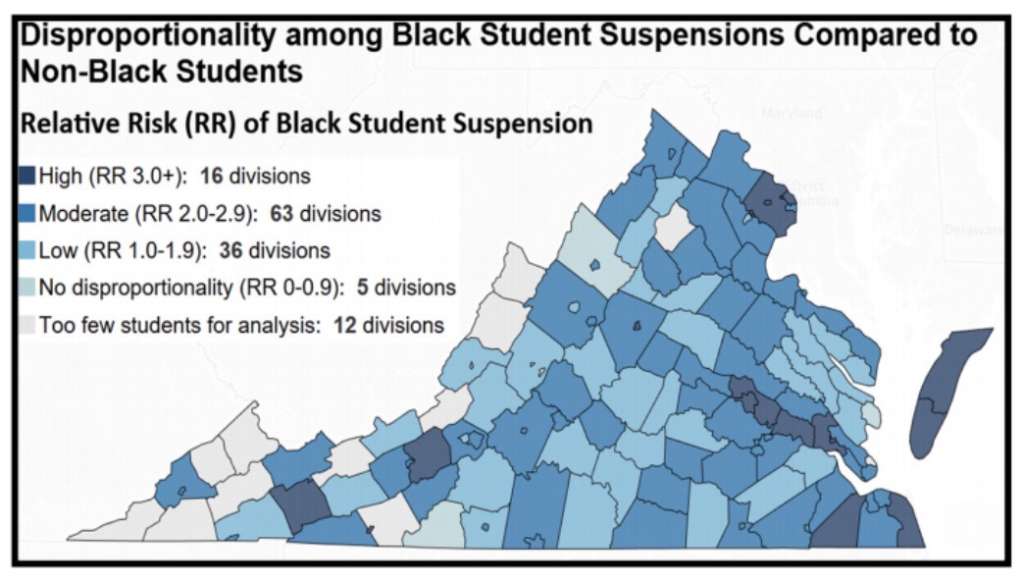Discrepancies in Discipline: Disproportionate Punishment of Students of Color in PWCS
Editor’s Note: This article has been updated to include a recent statement
Back to school time this fall looks very different from most years. Prince William County’s students ‘returned’ to school virtually due to the coronavirus pandemic. Simultaneously, school administrators locally, and nationally, must respond to the ongoing racial uprising, over the ways public schools perpetuate and reinforce racial inequities.
Prince William County School’s system is no stranger to scrutiny over their disproportionate discipline of students of color, particularly Black boys, compared to their white counterparts.
On May 10th 2017, Ryan Turk, who at the time was a Graham Park Middle School student was arrested and charged by the School Resource Officer with disorderly conduct and petit larceny for ‘stealing’ milk from the lunch line.
Ultimately prosecutors decided to drop the charges against Turk. The decision came after the situation made national headlines and received criticism for being an example of the school-to-prison pipeline.
School Board members and other school officials are unable to specific publicly about a specific student’s disciplinary record.
India Daniels, a resident and parent of school aged children, “moved to Woodbridge in 2015. So when I heard about that [Ryan Turk], I was taken aback, shocked, angry. So she “started to talking to moms in the area about wha was happening here, because me as a Black mother, I had two children who I planned to move here and raise and put through the [public] school district.”
In the aftermath Daniels “started doing research and that’s pretty much how it started. I worked with a number of parents in the area, to give me a feel for the school climate of Prince William. I saw that there were a lot of racial complaints. Particularly with bias, assumptions, negative assumptions, implicit or explicit bias. Not only from the School Resource Officers but the teachers and the administration. And so I started working with the community on hat effort.”
Anonymous List for Change, a non-profit Daniels worked for as an intern in 2017 (she now holds a position as a board member) worked with “volunteers, parents, and the community to develop the report.” Using “information from their submitted documents on discipline” and “Virginia Department of Education data.” Then “looking by race and by grade, elementary, middle, and high school” with a focus primarily on “short term suspensions.”
Upon completion, Anonymous List for Change “sent it [the report] to the school board and copied the superintendent.” Daniels relayed that “There was no direct response, there was change, there were changes made, but we never actually got a direct reply.” Two reports were created and provided to the county “one was in 2016-17 and one in 2017-18.”
Prince William County Schools has a ‘zero tolerance policy.’ Data profiles for individual schools on do not include statistics about disciplinary procedures. The Strategic Plan Report 2017-18 included goal 2.2.1 (shown below).

Such data aligns with Daniel’s observation that “The suspensions were overwhelmingly for African-American boys, despite in some cases making [up] only 8-10% of the population for some schools.”
Virginia’s Department of Education February 2020 Quarterly Research Bulletin concluded that “In Virginia, 16 of 132 school divisions reported a rate of suspension for Black students three times higher than rates of suspensions for non-Black students” (see map shown below).

One study on exclusionary discipline practices by Northeastern University found that “student removal was negatively affecting all students across all demographic categories.”
A forum on public policy report stated “Zero tolerance policies contribute to the already high drop-out rate for students of color.
Virginia legislators proposed a number of bills in 2018 to disrupt this school-to-prison pipeline process. This included 2018 House Bills 113, 445, and 296 as well as Senate Bill 170. Legislation continued to be proposed in the 2020 session, as a remedy, including House Bill 113, as well as, Senate Bills 170 and 296.
The Superintendent’s Advisory Council on Equity was created in 2018. “Starting really early was really our goal and changing the trajectory of how we treat our young Black boys in Prince William County” said Daniels speaking of her work and participation in the Superintendents Advisory Council.
“The purpose of the Superintendent’s Advisory Council on Equity is to work in an advisory capacity to the Superintendent in order to identify exemplary Division practices and review Division-wide data, resource distribution, and educational opportunities and access, while advocating for practices that result in increased student achievements with the goal that ALL students achieve our vision that every graduate be career and/or college-ready, and prepared to compete in the 21st Century global community. Here is a link to a report around the metrics the School Division is monitoring.” according to PWCS 2018-19 Equity Scorecard.
“School discipline is an evolving process. The idea is always to do the best that we can for our students and with our school families. Nothing is ever perfect but we’ll always continue to strive for the best.” said Loree Williams, Prince William County School Board Vice Chair.
In Colorado a teacher called the police on a student for playing with a nerf gun in his home while on camera for zoom class. The incident has since made national headlines as an example of the criminalization of young Black boys in schools. Leading some to wonder the ways in which virtual learning and the inequities present in Prince William County Schools intersect and create new or different problems.
Williams stated “we’ve made some modifications to our Code of Behavior” so that the policies align better with the virtual learning format. And that “the idea really is to be as accommodating as we can with [respect to] understanding students, family, and staff that there are still rules that are in place and they’re designed so that everybody has an opportunity to learn.”
She is also “very excited by some of the things that will be put in place by the state that will help educate our staff and school families when it comes to systemic racism and other practices that have historically played a major role in school discipline.”
Diana C. Gulotta, Director of Communications Services for said the main concerns around equity for virtual learning are “around equitable access to technology” and “providing education to our most vulnerable students, such as those with special needs or English Language Learners.”*
Daniels believes “Prince William is in a really good place right now to really start the equity work that needs to be done. It was thanks to the numerous volunteers, the community, interns, everybody who really joined in the effort to speak up and speak out about these issues.”
Chair Williams seems to be in alignment asserting that “we’re going to do our part in Prince William County to do the best that we can to educate and address those [disciplinary] issues so that we can bring equity to the forefront for all of our students.”
*Updated comments from Diana C. Gulotta on behalf of Prince William County Public Schools


